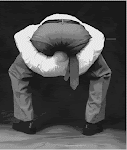...via friend and HH Nation reader Liz. Thanks, Liz.
This hilarious video should strike knowing and painful fear into the heart of anyone who's ever thought seriously about writing a movie.
But as funny as that video is, and as skillfully as it exposes the bland repetitiousness of many movies, I still think it's important to remember something that most people seem to want to reflexively disagree with: most movie formulas are good things.
I'll give you an example of what I mean. Back when I was living in Gainesville, there was a local band I saw a few times whose name I can't remember, so let's just call them Phantom Talent.
Phantom Talent were an example of a music style called "dischord," which gets it's particularly creative name from the fact that as a rule it eschews discernible chords and progressions, and from the fact that the "singing" generally consists, melody wise, of random yelling.
You see where I'm going with this. Here clearly was a band out as much to send a message as to make music. And their message was: fuck the conventions of chords, fuck the conventions of style, fuck the conventions of singing! Indeed, fuck you, audience!
The only reason Phantom Talent was even listenable was because it featured three of the best musicians in town, and because as much as they were trying to make a point about staid musical conventions, what they actually were was full of shit, since their songs still consisted of basic verse/chorus structure, and they were well rehearsed and tight through the changes.
There's an urge you've always got to fight as a creative person, and that's the urge to defy convention just for the sake of defying convention. Just because there's a formula out there that's worked for hundreds or thousands of years doesn't mean that formula is bad. Formula's are formulas for a reason. If you set out to break them for the sake of breaking them, more than likely you will be producing intolerable shit.
One of the first big things I discovered on my own as an adult was the Blues. Like a lot of kids who discovered it in the 60s, I was drawn in initially by the music of the English Blues Boom of The Rolling Stones, Led Zeppelin, Clapton and the like, and from there immersed myself in the music of guys like Son House, Leadbelly, Freddie King and Howlin' Wolf. Especially Freddie King.
I learned to play the guitar because of the blues. And one thing you learn pretty much right away is that every blues song is essentially the same. From a progressions standpoint, from an on-the-paper standpoint, there is very little flexibility in the blues.
And there's nothing wrong with that. The Blues is fundamentally an interpretive art, rather than a creative one, if you get my meaning. Put another way, it's not really about what you're playing, it's about how you're playing it. And that how is really all that separates the dingy, talentless lounge bands of the world from it's Eric Claptons.
These same lessons apply directly to moviemaking. You do not have a movie without conflict. You do not have a movie unless people want things and obstacles stand in their way. You do not have a movie unless it has surprises. You do not have a movie unless certain things are resolved.
What separates the men from the unemployed men is how you accomplish those things.
A particularly useful example of what I'm talking about is something called "Kierkegaard's Narrative," a existential plot outline that's been followed in movies such as American Beauty, Harold and Maude, High Fidelity, Sideways and many more. Great films all, but different films. But different in the how, rather than the what.
For a more comprehensive look at Kiekegaard's Narrative, click here.
So maybe this is all just me being an old fashioned stick in the mud, but I'm firmly of the opinion that moviemakers are first and foremost storytellers, not innovators. The goal of telling the story well should always take precedence over any other factor. And if that leads to innovation from a technical standpoint (Barry Lyndon being filmed by candlelight), editing standpoint (Rashomon's repeated subjective realities), or any number of other standpoints (The Empire Strikes Back making a key character a puppet), so much the better.
But let's not take a dump on movie formulas because of those lousy hacks who follow them in ways that are completely without imagination. They've done us well so far.







